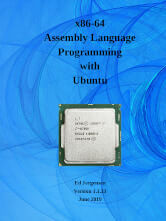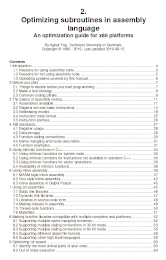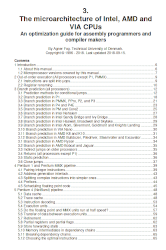Last Updated on May 22, 2022
5. x86-64 Assembly Language Programming with Ubuntu by Ed Jorgensen
 The purpose of this text is to provide a reference for University level assembly language and systems programming courses.
The purpose of this text is to provide a reference for University level assembly language and systems programming courses.
Specifically, this text addresses the x86-64 instruction set for the popular x86-64 class of processors using the Ubuntu 64-bit Operating System (OS).
While the provided code and various examples should work under any Linux-based 64-bit OS, they have only been tested under Ubuntu 14/16/18 LTS (64-bit).
6. Optimizing subroutines in assembly language: An optimization guide for x86 platforms
 This is an optimization manual for advanced assembly language programmers and compiler makers. Topics include: C++ intrinsic functions, inline assembly and stand-alone assembly. Linking optimized assembly subroutines into high level language programs. Making subroutine libraries compatible with multiple compilers and operating systems. Optimizing for speed or size. Memory access. Loops. Vector programming (XMM, YMM, SIMD). CPU-specific optimization and CPU dispatching.
This is an optimization manual for advanced assembly language programmers and compiler makers. Topics include: C++ intrinsic functions, inline assembly and stand-alone assembly. Linking optimized assembly subroutines into high level language programs. Making subroutine libraries compatible with multiple compilers and operating systems. Optimizing for speed or size. Memory access. Loops. Vector programming (XMM, YMM, SIMD). CPU-specific optimization and CPU dispatching.
7. The microarchitecture of Intel, AMD and VIA CPUs: An optimization guide for assembly programmers and compiler makers
 This manual contains details about the internal working of various microprocessors from Intel, AMD and VIA.
This manual contains details about the internal working of various microprocessors from Intel, AMD and VIA.
Topics include: Out-of-order execution, register renaming, pipeline structure, execution unit organization and branch prediction algorithms for each type of microprocessor. Describes many details that cannot be found in manuals from microprocessor vendors or anywhere else. The information is based on my own research and measurements rather than on official sources. This information will be useful to programmers who want to make CPU-specific optimizations as well as to compiler makers and students of microarchitecture.
Pages in this article:
Page 1 – Programming from the Ground Up and more books
Page 2 – x86-64 Assembly Language Programming with Ubuntu and more books
All books in this series:
| Free Programming Books | |
|---|---|
| Ada | ALGOL-like programming language, extended from Pascal and other languages |
| Agda | Dependently typed functional language based on intuitionistic Type Theory |
| Arduino | Inexpensive, flexible, open source microcontroller platform |
| Assembly | As close to writing machine code without writing in pure hexadecimal |
| Awk | Versatile language designed for pattern scanning and processing language |
| Bash | Shell and command language; popular both as a shell and a scripting language |
| BASIC | Beginner’s All-purpose Symbolic Instruction Code |
| C | General-purpose, procedural, portable, high-level language |
| C++ | General-purpose, portable, free-form, multi-paradigm language |
| C# | Combines the power and flexibility of C++ with the simplicity of Visual Basic |
| Clojure | Dialect of the Lisp programming language |
| ClojureScript | Compiler for Clojure that targets JavaScript |
| COBOL | Common Business-Oriented Language |
| CoffeeScript | Transcompiles into JavaScript inspired by Ruby, Python and Haskell |
| Coq | Dependently typed language similar to Agda, Idris, F* and others |
| Crystal | General-purpose, concurrent, multi-paradigm, object-oriented language |
| CSS | CSS (Cascading Style Sheets) specifies a web page’s appearance |
| D | General-purpose systems programming language with a C-like syntax |
| Dart | Client-optimized language for fast apps on multiple platforms |
| Dylan | Multi-paradigm language supporting functional and object-oriented coding |
| ECMAScript | Best known as the language embedded in web browsers |
| Eiffel | Object-oriented language designed by Bertrand Meyer |
| Elixir | Relatively new functional language running on the Erlang virtual machine |
| Erlang | General-purpose, concurrent, declarative, functional language |
| F# | Uses functional, imperative, and object-oriented programming methods |
| Factor | Dynamic stack-based programming language |
| Forth | Imperative stack-based programming language |
| Fortran | The first high-level language, using the first compiler |
| Go | Compiled, statically typed programming language |
| Groovy | Powerful, optionally typed and dynamic language |
| Haskell | Standardized, general-purpose, polymorphically, statically typed language |
| HTML | HyperText Markup Language |
| Icon | Wide variety of features for processing and presenting symbolic data |
| J | Array programming language based primarily on APL |
| Java | General-purpose, concurrent, class-based, object-oriented, high-level language |
| JavaScript | Interpreted, prototype-based, scripting language |
| Julia | High-level, high-performance language for technical computing |
| Kotlin | More modern version of Java |
| LabVIEW | Designed to enable domain experts to build power systems quickly |
| LaTeX | Professional document preparation system and document markup language |
| Lisp | Unique features - excellent to study programming constructs |
| Logo | Dialect of Lisp that features interactivity, modularity, extensibility |
| Lua | Designed as an embeddable scripting language |
| Markdown | Plain text formatting syntax designed to be easy-to-read and easy-to-write |
| Objective-C | Object-oriented language that adds Smalltalk-style messaging to C |
| OCaml | The main implementation of the Caml language |
| Pascal | Imperative and procedural language designed in the late 1960s |
| Perl | High-level, general-purpose, interpreted, scripting, dynamic language |
| PHP | PHP has been at the helm of the web for many years |
| PostScript | Interpreted, stack-based and Turing complete language |
| Prolog | A general purpose, declarative, logic programming language |
| PureScript | Small strongly, statically typed language compiling to JavaScript |
| Python | General-purpose, structured, powerful language |
| QML | Hierarchical declarative language for user interface layout - JSON-like syntax |
| R | De facto standard among statisticians and data analysts |
| Racket | General-purpose, object-oriented, multi-paradigm, functional language |
| Raku | Member of the Perl family of programming languages |
| Ruby | General purpose, scripting, structured, flexible, fully object-oriented language |
| Rust | Ideal for systems, embedded, and other performance critical code |
| Scala | Modern, object-functional, multi-paradigm, Java-based language |
| Scheme | A general-purpose, functional language descended from Lisp and Algol |
| Scratch | Visual programming language designed for 8-16 year-old children |
| SQL | Access and manipulate data held in a relational database management system |
| Standard ML | General-purpose functional language characterized as "Lisp with types" |
| Swift | Powerful and intuitive general-purpose programming language |
| Tcl | Dynamic language based on concepts of Lisp, C, and Unix shells |
| TeX | Markup and programming language - create professional quality typeset text |
| TypeScript | Strict syntactical superset of JavaScript adding optional static typing |
| Vala | Object-oriented language, syntactically similar to C# |
| VHDL | Hardware description language used in electronic design automation |
| VimL | Powerful scripting language of the Vim editor |
| XML | Rules for defining semantic tags describing structure ad meaning |
